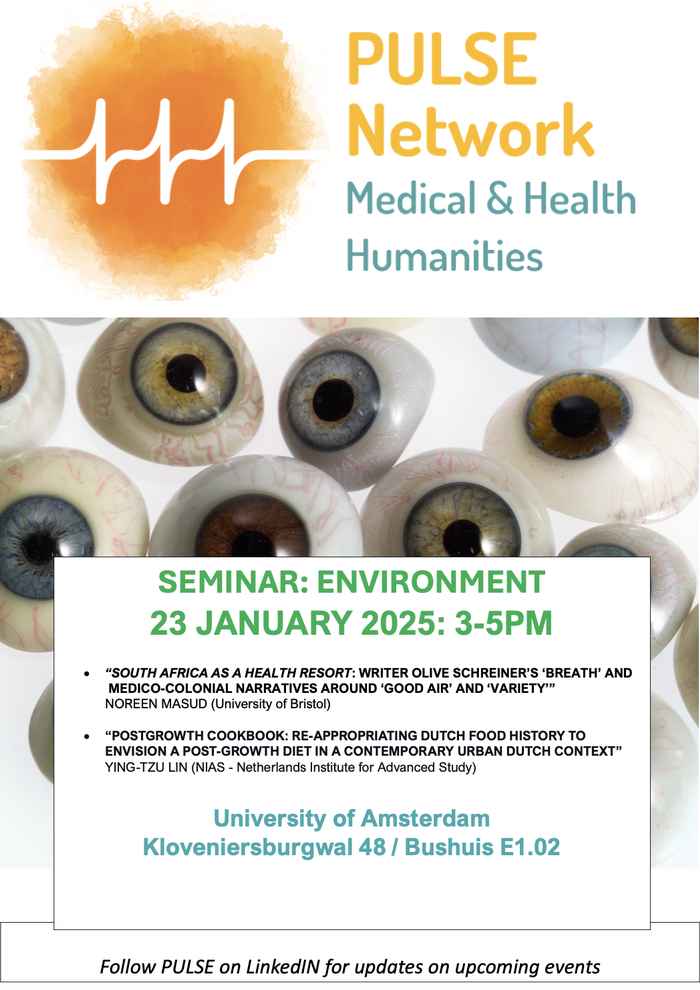The PULSE Seminar: Environment
Co-Hosted by UvA's Environment and Society research group and in association with ASH, and VU colleagues
- Date
- 23 January 2025
- Time
- 15:00
- Location
- Bushuis/Oost-Indisch Huis
- Room
- E1.02

'South Africa as a Health Resort: Writer Olive Schreiner's Breath and Medico-Colonial Narratives Around 'Good Air' and 'Variety'
Dr Noreen Masud (University of Bristol, UK)
Abstract: In the late nineteenth century, the medico-colonial establishment in Britain promoted South Africa as a destination for medical tourism. The dry, high-altitude air of the karoo in the Cape Colony made it a prime candidate. E. Symes-Thompson, a doctor specialising in chest disease, read his monograph South Africa as a Health Resort before the Royal Colonial Institute in 1888, extolling the virtues of South Africa for various chest complaints, as a 'region characterised by excessive dryness of air and soil'. He praises the karoo highly, as a place where invalids should consider moving even indefinitely – but tempers his praise with a warning. Though the karoo might be absolutely transformative of an individual’s health, he says, this has to be balanced against its, quote ‘want of…incident and variety’ and ‘trying’ ‘monotony’. This paper investigates how the author Olive Schreiner interrogates, integrates and resists these medico-colonial narratives around “good air” and “variety”.
Biography: Noreen Masud is a Lecturer in English Literature at the University of Bristol, and an AHRC/BBC New Generation Thinker. Her memoir-travelogue, A Flat Place (Hamish Hamilton [Penguin] and Melville House Press, 2023), was shortlisted for the Women’s Prize for Non-Fiction, the Sunday Times Charlotte Aitken Trust Young Writer of the Year Award, the Jhalak Prize, the RSL Ondaatje Prize and the Books are my Bag Reader Awards.
'Postgrowth cookbook: re-appropriating Dutch food history to envision a post-growth diet in a contemporary urban Dutch context'
Dr Ying-Tzu Lin (NIAS, Amsterdam)
Abstract: Food systems and consumption practices shape economic, socio- cultural, and environmental dimensions in our societies (Burlingame & Dernin, 2010). Responding to emerging global environmental concerns, international organizations (FAO) and various governments have proposed sustainable dietary guidelines mainly focused on reducing the intake of protein, fat, and dairy for health and environmental reasons (Fischer & Garnett, 2016). More recently, scholars have proposed a more radical pre-figurative scheme – that of post-growth – to imagine a food future not dominated by the growth-driven capitalist socio-economical mechanism (McGreevy et al., 2022; Savini et al., 2022; Schmid, 2022). From science-based dietary suggestions to radical social transformation theory, a historical lens is absent in these forward-looking policies and research in social transformation. In this research, I use historical cookbooks and nutritional history in the pre-modern period as ‘usable pasts’(Andah, 1995) to explore how historical culinary knowledge can offer insights for imagining a post-growth food future.
Biography: Ying-Tzu Lin is the Meertens research fellow at the Netherlands Institute for Advanced Study. She obtained her PhD in urban planning at the University of Amsterdam. Her research covers a wide range of socio-spatial relationships in urban public spaces, as well as food and cities. Besides academia, she is the co-founder and editor of a popular science web-based platform for urban studies 'Eyes on Place', and the artistic research collective Slutty Urbanism.
